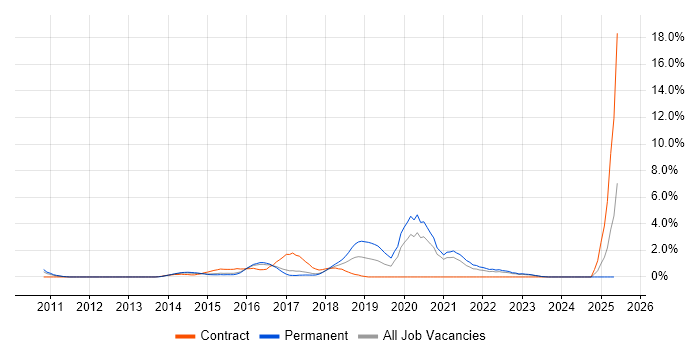NoSQL
West Yorkshire > Bradford
The table below provides summary statistics for contract job vacancies advertised in Bradford requiring NoSQL skills. It includes a benchmarking guide to the contractor rates offered in vacancies that cited NoSQL over the 6 months leading up to 23 June 2025, comparing them to the same period in the previous two years.
| 6 months to 23 Jun 2025 |
Same period 2024 | Same period 2023 | |
|---|---|---|---|
| Rank | 9 | - | - |
| Rank change year-on-year | - | - | - |
| Contract jobs citing NoSQL | 4 | 0 | 0 |
| As % of all contract jobs advertised in Bradford | 10.81% | - | - |
| As % of the Database & Business Intelligence category | 33.33% | - | - |
| Number of daily rates quoted | 1 | 0 | 0 |
| Median daily rate (50th Percentile) | £550 | - | - |
| West Yorkshire median daily rate | £550 | £550 | £575 |
| % change year-on-year | - | -4.35% | +15.00% |
All Database and Business Intelligence Skills
Bradford
NoSQL falls under the Databases and Business Intelligence category. For comparison with the information above, the following table provides summary statistics for all contract job vacancies requiring database or business intelligence skills in Bradford.
| Contract vacancies with a requirement for database or business intelligence skills | 12 | 8 | 18 |
| As % of all contract IT jobs advertised in Bradford | 32.43% | 16.00% | 18.37% |
| Number of daily rates quoted | 6 | 8 | 10 |
| 10th Percentile | £471 | £409 | - |
| 25th Percentile | £556 | £463 | £450 |
| Median daily rate (50th Percentile) | £595 | £545 | £513 |
| Median % change year-on-year | +9.17% | +6.34% | +13.89% |
| 75th Percentile | £618 | £641 | £634 |
| 90th Percentile | £656 | £699 | £654 |
| West Yorkshire median daily rate | £504 | £500 | £550 |
| % change year-on-year | +0.75% | -9.09% | +15.79% |
NoSQL
Job Vacancy Trend in Bradford
Job postings citing NoSQL as a proportion of all IT jobs advertised in Bradford.

NoSQL
Contractor Daily Rate Trend in Bradford
3-month moving average daily rate quoted in jobs citing NoSQL in Bradford.
NoSQL
Co-occurring Skills and Capabilities in Bradford by Category
The follow tables expand on the table above by listing co-occurrences grouped by category. The same employment type, locality and period is covered with up to 20 co-occurrences shown in each of the following categories:
